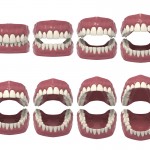
Denture stomatitis is relatively common with studies suggesting that it can affect 35-50% of complete denture wearers. It is characterised by mild inflammation and redness of the oral mucosa and about 90% are associated with Candida. The aim of this review was compare the efficacy of antifungal therapy with any other alternative methods used for the treatment of denture stomatitis.
The Cochrane Central Register of Controlled Trials (CENTRAL), Cochrane Database of Systematic Reviews, Medline and Embase databases were searched for randomised controlled trials (RCTs) which compared antifungals with any other alternative or placebo, used for the treatment of denture stomatitis. Clinical signs of remission of denture stomatitis and reduction in Candida colony counts were the outcomes considered. Study quality was assessed using Cochrane methodology.
- 15 manuscripts on 14 randomized controlled trials were included.
- 8 studies with comparable outcomes contributed to the meta-analyses
- No statistically significant difference between antifungal treatment and disinfection methods was found for both clinical and microbiological outcomes.
- Meta-analysis showed a statistically significant difference between an antifungal and a placebo for the microbiological outcome (OR=0.32; 95% CI: 0.12-0.89; Z=-2.2; p=0.028), favouring the antifungals
- there was no statistically significant difference between antifungal and placebo for the clinical outcome (OR=0.2; 95% CI: 0.04-1.04; Z=-1.9; p=0.056).
The authors concluded:-
The findings of this review and meta-analysis suggest that disinfection methods could be considered as an adjunct or alternative to antifungal medications in the treatment of denture stomatitis.
Comment
While the authors have been able to include a number of studies in a meta-analysis the number of studies is small overall considering that this is a common problem. The authors also note that the number of participants in the included studies is also small. They also note that only 3 of the studies reported on the methods of random sequence generation and allocation concealment and overall the study quality table shows that the study quality is low. A Cochrane Protocol has been published on interventions for treating denture stomatitis (Hugo et al) but a review is yet to be published. Although as the authors of this review have based their search strategy on the one proposed by Hugo et al one might anticipate similar findings.
Links
Emami E, Kabawat M, Rompre PH, Feine JS. Linking evidence to treatment for denture stomatitis: a meta-analysis of randomized controlled trials. J Dent. 2013 Dec 4. pii: S0300-5712(13)00321-7. doi: 10.1016/j.jdent.2013.11.021. [Epub ahead of print] PubMed PMID: 24316341.
Hugo FN, Hilgert JB, Medeiros LRF. Interventions for treating denture stomatitis (Protocol). Cochrane Database of Systematic Reviews 2005, Issue 4. Art. No.: CD005518. DOI: 10.1002/14651858.CD005518.
